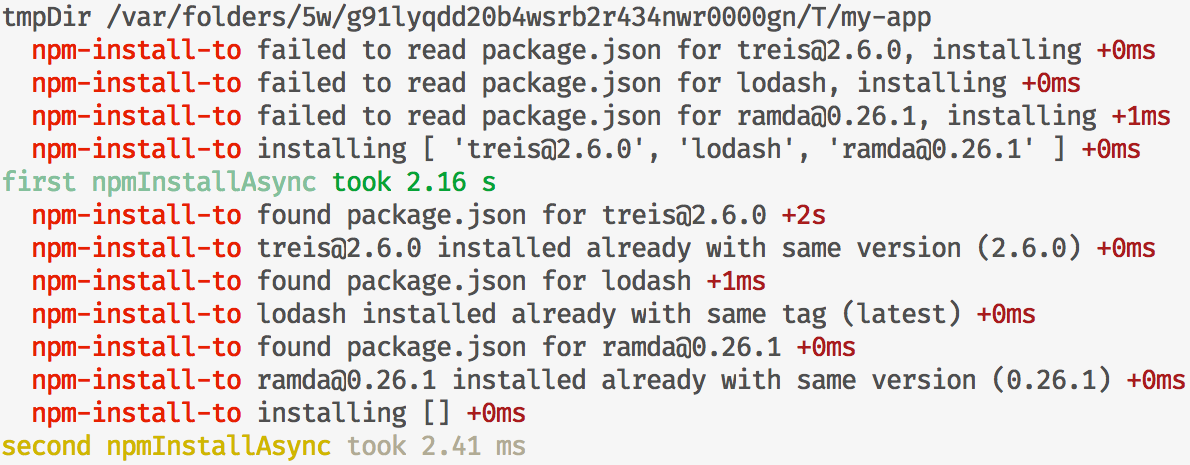Install npm modules programmatically
- under the hood, uses globally installed npm through
npm-install-to - takes packages in the equivalent format as
npm install@scope/namename@tag/versiongithubusername/repo- etc.
- once installed packages will resolve instantly due to caching
npm install runtime-npm-installProvides two functions, of which npmInstallAsync returns metadata of installed
modules, while npmImportAsync returns a list of what installed modules export.
The argument installPath determines where modules should be npm installed on
the file system. It defaults to a temporary directory, but should be given if
you wish subsequent invocations to either function to be quick. See
npm-install-to for more on
the caching.
The argument of packages is a list of package specs as strings, corresponding
to how npm install command is given packages to be installed. More information
on that available with npm help install.
Installs specified packages, returning a promise that resolves to an object
containing output of npm install and metadata of installed packages.
const { npmInstallAsync } = require('../')
const path = require('path')
const tmpDir = path.join(require('os').tmpdir(), 'my-app')
npmInstallAsync([
'treis@2.6.0',
'lodash',
'ramda@0.26.1'
], tmpDir)
.then(console.log){ packages:
[ { spec: 'treis@2.6.0',
name: 'treis',
json: [Object],
path:
'/var/folders/5w/g91lyqdd20b4wsrb2r434nwr0000gn/T/my-app/node_modules/treis' },
{ spec: 'lodash',
name: 'lodash',
json: [Object],
path:
'/var/folders/5w/g91lyqdd20b4wsrb2r434nwr0000gn/T/my-app/node_modules/lodash' },
{ spec: 'ramda@0.26.1',
name: 'ramda',
json: [Object],
path:
'/var/folders/5w/g91lyqdd20b4wsrb2r434nwr0000gn/T/my-app/node_modules/ramda' } ],
npmOutput:
'+ treis@2.6.0\n+ ramda@0.26.1\n+ lodash@4.17.11\nadded 12 packages from 9 contributors and audited 15 packages in 1.492s\nfound 0 vulnerabilities' }Installs specified packages, returning exports corresponding to each package as a list.
Use to check which given packages would be installed by either of the functions.
This function comes directly from npm-install-to.
const { npmImportAsync } = require('runtime-npm-install')
;(async () => {
const [treis, _, R] = await npmImportAsync([
'treis@2.6.0',
'lodash',
'ramda@0.26.1'
])
R.add(1, _.add(5, 1)) // 7
})()const { npmInstallAsync } = require('npm-install-to')
const path = require('path')
const taim = require('taim')
const tmpDir = path.join(require('os').tmpdir(), 'my-app')
console.log('tmpDir', tmpDir)
;(async () => {
await taim('first npmInstallAsync', npmInstallAsync)([
'treis@2.6.0',
'lodash',
'ramda@0.26.1'
], tmpDir)
await taim('second npmInstallAsync', npmInstallAsync)([
'treis@2.6.0',
'lodash',
'ramda@0.26.1'
], tmpDir)
})()